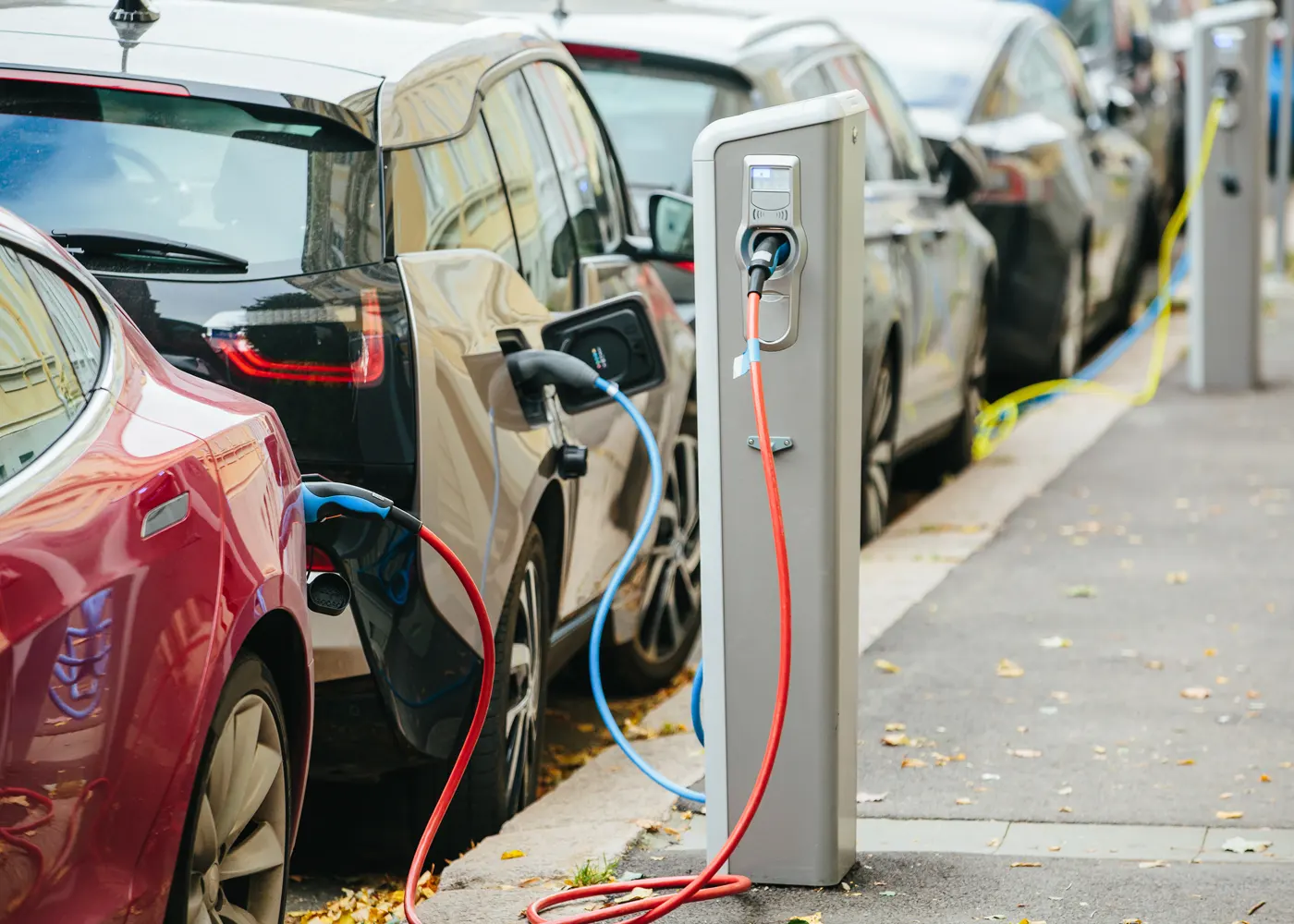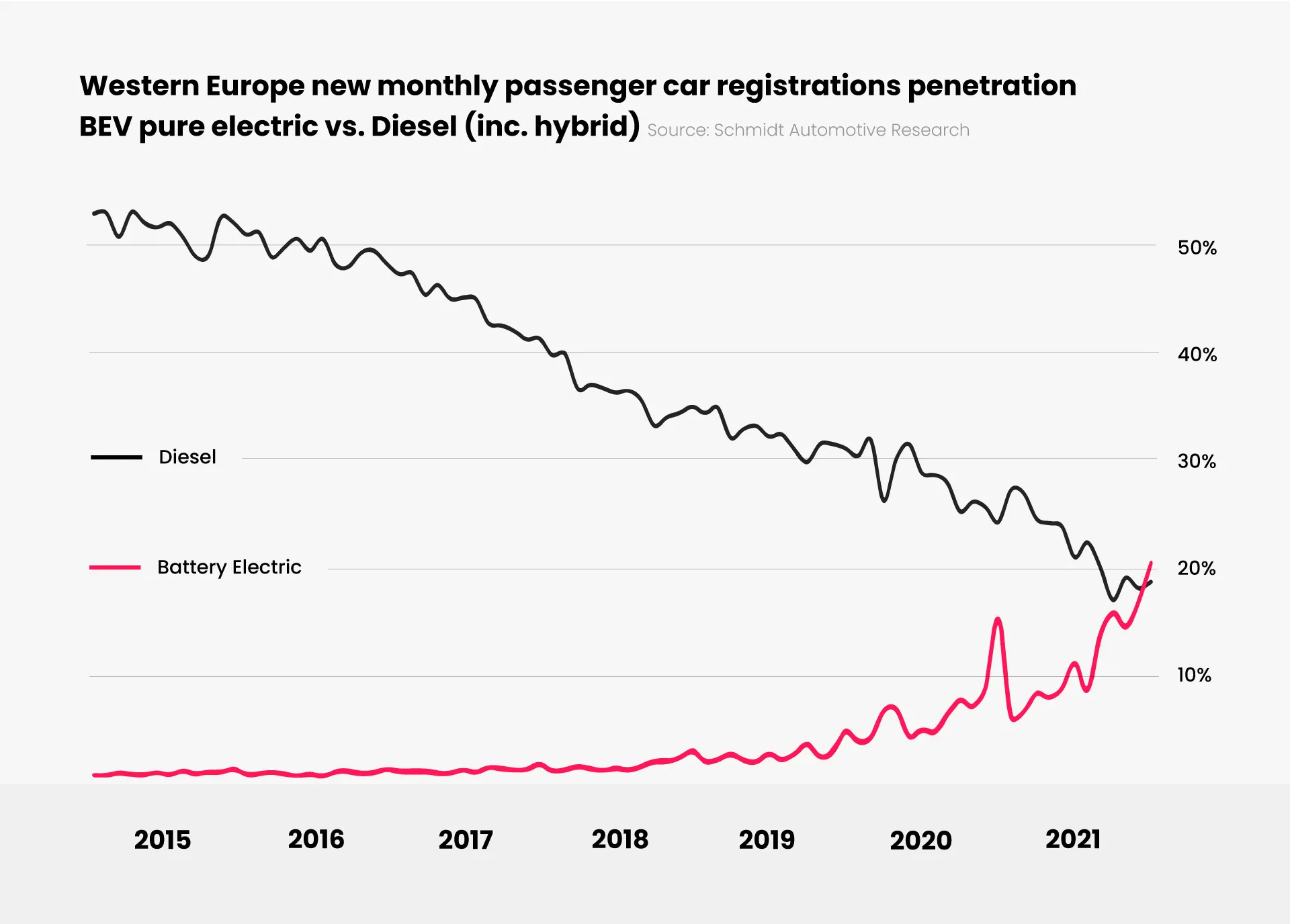S h a r e
EV sales overtake diesel for the first time


Posted by
Kevin Blackmore
March 2022
For the first time ever, the sale of electric vehicles in Europe surpassed the sale of diesel cars – demonstrating the rapid growth of the sector and a positive change in consumer habits to greener alternatives.
Across 18 European markets – including the UK – more than 20% of vehicles sold were electric, while diesel cars slumped to less than 19%.
In December, around 176,000 battery EVs were sold in Western Europe – an all-time record high and a 6% increase on December 2020 levels – while European carmakers sold 160,000 diesel cars.
The figures are proof – if proof were needed – of the extent of the movement to electrification across all major European markets.

In the UK, it’s a similar picture as the electric movement gains further impetus. Last year was the most successful year in history for electric vehicle uptake as more new battery electric vehicles (BEVs) were registered than over the previous five years combined.
During 2021, some 190,727 new BEVs joined Britain’s roads, along with 114,554 plug-in hybrids (PHEVs), meaning 18.5% of all new cars registered in 2021 can be plugged in.
This is in addition to the 147,246 hybrid electric vehicles (HEVs) registered which took a further 8.9% market share in a bumper year for electrified car registrations, with 27.5% of the total market now electrified in some form.
Indeed, the shift in customer preference for these new technologies continues apace, with December seeing BEVs take a record market share, accounting for 25.5% of all new registrations.
Choice drives shift
One of the factors behind this seismic shift in new car buying habits is the wide choice of EVs that are now available. Following billions of pounds of investment into new technology by manufacturers, more than 40% of models are now available as plug-ins.
The UK finished 2021 as the third-largest European market for new car registrations but the second largest by volume for plug-in vehicles and the second largest for BEVs.
It is only in ninth position overall, however, in Europe for BEVs by market share, underlining the progress still to be made, despite the UK having among the most ambitious targets of all major markets with the end of sale of new petrol and diesel cars scheduled for 2030.
However, all is not sweetness and light, says the Society of Motor Manufacturers and Traders, the motor industry’s trade body. Recent government announcements, including cuts to both purchase incentives and grants for home chargers, put the achievement of the industry and the government’s own net-zero ambitions at risk, says the Society.
Furthermore, the slow pace of growth in on-street public charging – where, on average, 16 cars potentially share one standard on-street charger – could put the brake on EV demand and undermine the UK’s attractiveness as a place to sell electric cars, argues the trade body.
The end of year figures show that petrol-powered vehicles, including mild hybrids (MHEVs), still remain Britain’s most popular powertrain, accounting for 58.3% of all new cars registered in 2021.
On the other hand, diesel-powered cars including MHEVs made up just 14.2% of the market, and they were followed by BEVs at 11.6%, HEVs at 8.9% and PHEVs at 7.0% of total sales in 2021.
Electrified vehicles dominate registrations
This year has started on a positive note as 115,087 new cars were registered in January, according to the SMMT. Registrations were up by more than a quarter (27.5%) on January 2021, when lockdown restrictions kept car showrooms shut, with almost a third of new cars being electrified.
However, the market remains well below pre-pandemic levels, and was 22.9% lower than in January 2020, as chip shortages, in particular, continued to impact supply.
The growth was driven by private buyers, as manufacturers sought to prioritise these customers given the supply constraints, with this segment of the market registering 62,300 new cars, up 64.1%, year on year – and just -5.6% off pre-pandemic levels. Large fleet registrations, meanwhile, remained broadly level with last year at 50,817 units.
Electrified vehicles – BEV, PHEV and HEV cars – accounted for 71.5% of the uplift in registrations. Plug-in vehicles enjoyed another bumper month, with 14,433 BEVs and 9,047 PHEVs registered, equal to some 20.4% of the market. With 13,492 HEVs also registered, almost one in three new cars in January was electrified.
Despite the challenges of 2021, with manufacturers battling against global semiconductor shortages, new trading arrangements and Covid impacts, including shuttered showrooms and staff shortages, it was a record year for zero and ultra-low emission vehicles. As a result, new data shows that average new car CO2 emissions fell by 11.2%, to its lowest ever recorded level of 119.7g/km.
The abundance of choice was undoubtedly one of the key factors in electric growth. There are now more than 140 plug-in car models available to UK buyers, with almost 50 more scheduled for release in 2022.
Cutting CO2 even further, however, will require more drivers to switch to electric and other zero-emission technologies says the SMMT. One of the obstacles remains perceptions of a lack of charging infrastructure, which must be built ahead of demand – and that demand is increasing exponentially.
You also might like…
If you liked this article then check out our posts about similar topics
Eurocell adds huge van order to fleet following advice from Fleet Alliance
Eurocell, the UK's leading upvc window, door and conservatory manufacturer and distributor, has replaced a large proport...
Fleet Alliance archives Intelligent Car Leasing brand to focus on core fleet business
Fleet Alliance has discontinued its Intelligent Car Leasing brand, which specialised in consumer leasing The Glasgow ...
JG Pest Control updates fleet with new Peugeot Partners from Fleet Alliance
JG Pest Control, one of the country’s leading pest control operators, has updated its fleet thanks to a new batch of P...
Warp Snacks opts for EV salary sacrifice scheme with Fleet Alliance
Healthy snacks manufacturer Warp Snacks, has introduced an electric car salary sacrifice scheme for staff in conjunction...
Chancellor cuts National Insurance, extends fuel duty freeze and fully expenses leased assets
In the last Budget before the General Election, Chancellor Jeremy Hunt unveiled a series of headline-grabbing initiative...
2024 will be the year of the EV with greater supply and lower prices, says Fleet Alliance
2024 will be the year that companies look to accelerate down the electrification route, as they seek to meet their own E...
Automotive transmission specialist Xtrac opts for EV salary sacrifice scheme from Fleet Alliance
Xtrac, the world’s leading supplier of high-performance transmissions for top level motorsport and high-performance au...
Fleet Alliance reports strong uptake in EV salary sacrifice
Increasing numbers of businesses are adding the employee benefit of leasing an EV through a salary sacrifice scheme to t...
Ready to make the management of your fleet more efficient?
Request a call back
